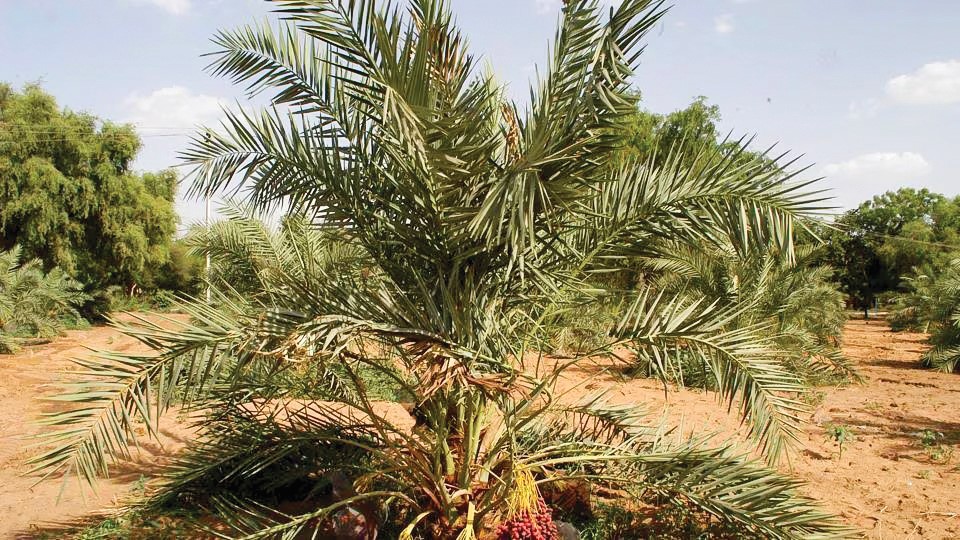The date palm stands tall as a symbol of sweetness. These trees, with their crown of feathery fronds, have found a home in parts of Rajasthan, offering a fruit that’s both a delicacy and a staple.
Special Features
What makes Rajasthan’s dates special is their ability to thrive in an environment that challenges most crops. These fruits, born from palms that reach towards the scorching sky, carry within them the essence of the desert – a concentrated sweetness that speaks of survival against odds.


Varieties
While many varieties of dates are grown worldwide, Rajasthan focuses on a few that are well-suited to its climate. The Barhee and Khuneizi varieties are popular choices, known for their ability to withstand high temperatures and produce sweet, flavorful fruit. Some farmers are also experimenting with the Medjool variety, prized for its large size and rich taste.
Growing Regions
Date palm cultivation in Rajasthan is primarily concentrated in the western parts of the state, particularly in districts like Jaisalmer, Barmer, and parts of Jodhpur. These areas, with their arid climate and sandy soils, provide conditions similar to the date palm’s native habitat.
Climate and Cultivation
The harsh climate of Rajasthan, often seen as a challenge for agriculture, is actually a boon for date palms. These trees thrive in the intense heat, with temperatures often soaring above 40°C (104°F) during summer. The low humidity and scarce rainfall typical of the region help prevent fungal diseases that can affect date palms in more humid areas.
Irrigation Techniques
While date palms are drought-resistant, they do require regular watering to produce quality fruit. Rajasthani farmers have adapted traditional and modern irrigation techniques to meet this need. Many use drip irrigation systems, which conserve water while ensuring the trees receive consistent moisture. Some farmers have revived ancient water harvesting techniques, creating small catchment areas around each tree to maximize the use of scarce rainfall.
Harvest Season
The date harvest in Rajasthan typically begins in late July and can extend into September. This timing coincides with the monsoon season, which presents both opportunities and challenges. The increased humidity can affect the fruit’s drying process, so farmers must time their harvest carefully to ensure the best quality.
Stages of Ripeness
Dates in Rajasthan are harvested at different stages of ripeness, each prized for different qualities:
Khalal stage: The fruit is crunchy and sweet, with a vibrant yellow or red color.
Rutab stage: Partially ripe, softer, and with a more intense sweetness.
Tamar stage: Fully ripe, with a dark color and chewy texture.
Each stage offers a unique flavor profile and is used in different culinary applications.
Quality and Taste
Rajasthan’s dates are known for their intense sweetness, a result of the region’s hot, dry climate. The fruit tends to be smaller than dates grown in more temperate regions, but what they lack in size, they make up for in flavor concentration. The low humidity during the growing season results in dates with a lower moisture content, giving them a chewy texture and long shelf life.
Nutritional Value
Dates are not just a sweet treat; they’re also a nutritional powerhouse. Rich in natural sugars, fiber, and essential minerals like potassium and magnesium, they provide a quick energy boost. In Rajasthan’s hot climate, dates serve as a natural way to replenish electrolytes lost through perspiration.
Cultural Significance
In Rajasthan, dates hold a special place in local culture. They’re often offered as a welcoming gesture to guests, symbolizing hospitality and sweetness. During religious festivals, especially in Muslim communities, dates play an important role in breaking fasts and as gifts.
Economic Impact
Date farming has emerged as a valuable alternative crop for Rajasthan’s farmers, especially in areas where water scarcity limits other agricultural options. The industry provides employment not just in farming but also in processing, packaging, and distribution. Some enterprising farmers have started producing value-added products like date syrup and date powder, creating new economic opportunities.
Challenges
Despite their suitability to the climate, date palms in Rajasthan face several challenges:
Water scarcity: While drought-resistant, the trees still need consistent irrigation.
Pest management: Red palm weevils and birds can damage crops if not managed properly.
Post-harvest handling: The high sugar content makes dates susceptible to fermentation if not dried or stored correctly.
Farmers are continually adapting their practices to address these challenges, often blending traditional knowledge with modern agricultural science.
Research and Development
Agricultural universities in Rajasthan are conducting research to develop date palm varieties even better suited to local conditions. There’s also ongoing work to improve pollination techniques and optimize water use in date orchards.
Sustainable Practices
Many date farmers in Rajasthan are adopting sustainable practices. Some are integrating date palms into agroforestry systems, planting other crops in the shade of the palms to maximize land use. Others are exploring organic farming methods, using natural pest control and fertilizers.
Market Reach
While most of Rajasthan’s dates are consumed within India, there’s growing interest in export markets. The unique flavor profile of these desert-grown dates is attracting attention from international buyers, particularly in the Middle East and Southeast Asia.
Future Prospects
As climate change makes some traditional crops less viable, the heat-loving date palm offers a sustainable alternative. There’s also potential for agritourism, with some farmers opening their orchards to visitors interested in learning about desert agriculture.
Culinary Uses
In Rajasthani cuisine, dates find their way into both sweet and savory dishes. They’re used in traditional desserts, added to savory rice dishes for a touch of sweetness, and even incorporated into chutneys and sauces. Some innovative chefs are experimenting with date-based products like date vinegar and date-sweetened beverages. From the sandy soils of the Thar Desert, these fruits emerge as sweet reminders of what’s possible when traditional knowledge meets modern agriculture.









